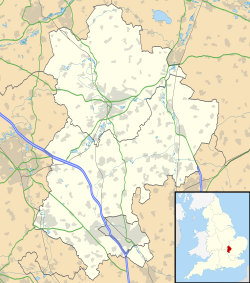| West End | |
|---|---|
Location within Bedfordshire | |
| OS grid reference | SP985522 |
| Civil parish | |
| District | |
| Unitary authority | |
| Ceremonial county | |
| Region | |
| Country | England |
| Sovereign state | United Kingdom |
| Post town | BEDFORD |
| Postcode district | MK43 |
| Dialling code | 01234 |
| Police | Bedfordshire |
| Fire | Bedfordshire and Luton |
| Ambulance | East of England |
| UK Parliament | |

West End is a hamlet in the civil parish of Stevington, in the Borough of Bedford in Bedfordshire, England.
The settlement is close to Carlton, Pavenham and Stevington. West End also forms part of the wider Stevington civil parish.
